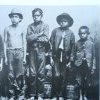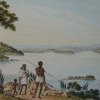1900s
1900
1901
The well known activist Pearl Gibbs is born near Botany Bay. She is the first woman, and one of the first Koori people, in the 1940s, to become a member of the Aborigines Welfare Board. She complains that the Board members drink in the hotel so as to deny her entry to their discussions. (In the 1940s women did not drink in the public bars, and Koori people were not allowed into hotels at all).
1903
1907
Pat Eatock’s family come to Sydney from Bowral where the family has been working. There are more opportunities here. They settle on the foreshore of Balmain, where some of the boys want to join boxing gymnasiums. Others work in the White Bay waterside industries. Alec, another member of the family, works at the Brick kiln at St Peters. One of the popular gymnasiums is run by Ray Horne.(V21, ‘Koori lads training in Ray Horne’s gym’)
1908
1909
The Aborigines Protection Act is made law. Robert Donaldson, later to become the Aboriginal Protection Board’s Chief Inspector of Aborigines, advocates that the ‘only solution of this great problem [of growing reserve populations] is ‘the removal of the children and their complete isolation from the influences of the camps’. (Edwards and Read xiii – xv) This policy demand continues what the Board Chairperson George Thornton has advocated two decades earlier.













